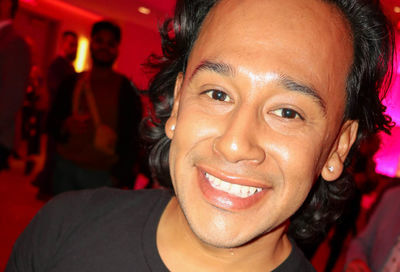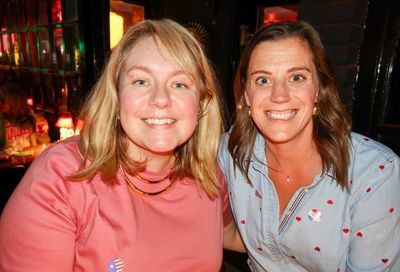Being Jazz: An interview with Jazz Jennings
Jazz Jennings has been an inspiration for transgender individuals for many years -- and at age 14, she's only just begun

Before Caitlyn Jenner, before Laverne Cox, before Chaz Bono, there was Jazz Jennings.
Back in 2007, Jennings and her parents sat down with Barbara Walters for a 20/20 interview where the seven-year-old revealed to the world that she is transgender.
By that point Jennings had already been presenting as a girl for a few years. In fact, she started expressing gender dysphoria from the moment she could speak, and as a toddler played with feminine toys and only wanted to wear her older sister’s clothes and costumes. “I have a girl brain in a boy’s body,” she used to say, as documented in a new TLC reality series about her and her family, I Am Jazz.
The title of the show is strikingly similar to Jenner’s new E! channel series, I Am Cait — although once again Jazz was out first, debuting almost two weeks earlier. Certainly, both shows tread similar ground, providing unprecedented access into transgender life today. Naturally, Jazz Jennings’ life is very different from Caitlyn Jenner’s. For one thing, Jennings is not a household name — it’s not even her real name. Her parents, Greg and Jeanette, adopted the name Jennings for the Walters interview, to add a layer of privacy. Even now, we only know the bare minimum about the family’s background, occupations and even whereabouts, identified simply as South Florida.
The Jennings family, which also includes 19-year-old Ari and 16-year-old twin boys Sander and Griffen, displays a genuine, tight bond in I Am Jazz. It’s a sensitive, engaging snapshot of family life and everyone conveys a remarkable degree of unconditional love and support for one another. That’s especially true when it comes to Jazz.
“I just love hanging out with her,” says mother Jeanette, who is understandably leery of her baby starting high school this fall. High school is a big step down the path of Jazz becoming an adult — and a woman. Jazz’s doctor has put her on hormone blockers to prevent development of male traits, as well as given her doses of estrogen to help develop breasts and suppress testosterone levels. “Jazz is developing nicely, like a young lady, like she should be,” Jeanette tells Jazz’s wonderfully open-minded grandparents after a visit with the doctor on the show. But she quickly adds, “This is scary! This is experimental stuff. Like I am messing with my kid’s body!”
Every indication suggests the Jennings are doing the right thing by Jazz. She seems every bit as happy as a typical 14-year-old girl. Maybe even more so: As a result of the support and feedback she’s received, particularly in response to the children’s book (also titled I Am Jazz) she co-wrote in 2013 with Jessica Herthel, Jazz has more than just her family behind her. As she puts it, “I feel like the whole community is really there to support me and make sure that I find my happiness in life.”
METRO WEEKLY: Jazz, let me start by asking if you’re happy with the new series?
JAZZ JENNINGS: Yeah, I’m definitely happy with the way it’s turning out. It definitely captures the essence of our life and how we’re just a normal family, just doing our thing.
MW: Jeanette, I know this has been several years in the making. What motivated you to go public in the first place, with the 2007 Barbara Walters interview?
JEANETTE JENNINGS: They reached out to us — we really were not interested in being in the media at all. It took them 10 months of wooing us to even convince us to do it. We were not ready to share something so personal. We didn’t know any other people who had a transgender kid so young. We weren’t ready to go in the national spotlight originally, but we worked with them, we talked with them. [Eventually, we said,] “Okay we’ll do it, but we don’t want to show our faces. And we certainly don’t want to give our first names or our last name. And you can do this and can’t do that.” In the end, we compromised and said we would show our faces. You know, you really have to see Jazz to get the whole situation. To see her in her environment, with her friends and family — to know and see that she truly is a girl. A lot of people, if they didn’t see her face, would probably envision somebody who looks like a little boy in a dress.
MW: What was the first memory you have that suggested something was different with Jazz?
JEANETTE: Some of the earliest memories I have of Jazz not acting like a stereotypical boy were before she was even two years old. She was just always acting feminine. She gravitated toward all the feminine toys and only wanted to dress up in clothes from her big sister’s chest, with all her little costumes and everything. She used to love to wear plastic high heels. And as soon as she could verbalize it, she would tell me that she was a girl. It wasn’t just like a little boy that liked to play with girly things. She insisted consistently, persistently, that she was a little girl. Which to me was a red flag that this was not a phase.
JAZZ: When I was two years old, I remember there was this pink cassette tape that had the word Barbie on it. And I really loved that tape. I looked around the whole house for that tape. I really wanted to play with Barbie! I don’t know, that’s just some weird fragmented memory that I have.
MW: We can see through the show that you are very much a typical teenager, yet you also seem very mature for your age and a bit more enlightened than most 14-year-olds are. Is that a fair assumption?
JAZZ: My family says that I was born with this natural confidence, but really I feel that it wouldn’t have been discovered and embraced without their love and support. Because they just encouraged me to be myself. Along this whole journey I was able to become a confident and happy person and therefore use my story of happiness and love, and spread that towards other people. If you think of me as mature, I guess maybe sometimes I am mature, but other times I’m really immature and crazy.
JEANETTE: The public persona of Jazz is very mature. When she gives a speech and she’s doing her advocacy work, she’s always been very, very articulate and wise beyond her years since she was little. But of course, still, she can act like your typical teenager. Which also comes across in the show.
MW: Certainly — and she’s also a very funny teenager too.
JEANETTE: She is hysterical. She keeps us laughing all the time.
MW: Jazz, what is it like for you to be an activist and role model?
JAZZ: Well, I don’t know if I would consider myself a role model. But really, in sharing my story for many years, I’ve seen a lot of positive feedback and people who I’ve impacted, it’s just so encouraging. And it really motivates me to continue sharing my story. I’m proud to be a representation of transgender kids for people to see, but I feel that I’m just doing my part in trying to achieve equality for all.
MW: Who would you identify as role models?
JAZZ: Right now, transgender rights are at the forefront of the civil rights movement and there’s a lot of visibility on the topic of being transgender. I thank huge role models like Laverne Cox and Janet Mock and Chaz Bono and Caitlyn Jenner — all those amazing people willing to share their stories and make a difference in the world.
I definitely think with all this visibility, people are finally starting to open up their minds and times are changing. It’s all happened so fast with Caitlyn Jenner coming out and sharing her story. I’m glad to see that many transgender people out there aren’t afraid to step out of the shadows and live their lives authentically, because there are these inspirations out there who really guide the way for many other transgender kids or individuals.
MW: You basically came out before all of them. Has their coming out helped you in any way?
JAZZ: I’ve already transitioned. And I’ve been able to present as a girl, the way I identify as. But now, it’s time for society to transition along with me, and accept me for who I am. And I feel that with the visibility of Caitlyn Jenner sharing her story, and Laverne Cox — all these inspirations — people are finally becoming more accepting of transgender individuals, and in that way it does help me. Now, in telling someone that I’m transgender, I can say I’m a mini-Caitlyn Jenner and they’ll understand immediately. It makes it easier to explain when people ask. They’re educated and understand what it means to be transgender. So yeah, it’s definitely made a difference for me.
MW: Have you met Caitlyn?
JAZZ: No, I haven’t.
JEANETTE: Jazz actually sat at the ESPYS, right behind Brody Jenner, and the rest of the clan. But it was directly behind Brody. So she was close to Caitlyn, but didn’t quite get there.
MW: What did you think of Caitlyn’s speech?
JAZZ: It was incredible. I was crying.
MW: It’s also interesting because she’s a sports hero, an Olympian, and I know you’re a soccer player. So that must also inspire you.
JAZZ: Yeah, for sure.
JEANETTE: There are not a lot of young people out there who are transgender athletes. They’re kind of afraid because so many of them, their birth certificates say their biological sex on it. So therefore, many male-bodied people are forced to have to play on the boys team even though they don’t want to. So they just say, might as well not play at all.
MW: And that’s something that you had to fight for.
JEANETTE: Oh yeah, we fought for the right for Jazz to play soccer for over two years. She was banned from playing girls soccer.
MW: That must have been a trying experience.
JEANETTE: Yes, it was horrible. Jazz didn’t want to give up though. She still wanted to play. So she practiced — she was allowed to practice with the girls, but sit out the games. And then she tried playing with the boys for several months, but she wasn’t happy doing that. She did her best, and she was very brave, because we never knew, “Would there be an answer to this? Would we be able to resolve the issue?”
MW: Jazz, did you find there was a difference between playing with boys versus playing with other girls?
JAZZ: There was definitely a mental difference for me, because when I was playing with the boys it reminded me of when I used to live as a boy and present myself as male. It brought back those bad memories. It was just not pretty for me and I often would shut down on the field during the game.
MW: Your friends are encouraging you to try out for varsity this year. Have you made that decision yet?
JAZZ: I haven’t decided if I’m going to play JV or varsity yet in high school, but tryouts are in a few months so I guess I’ll just have to decide then.
MW: Do you feel like you’re ready for high school?
JAZZ: High school is very nerve-wrecking — a lot of people are telling me that. Maybe people won’t become mature, and they won’t accept you for who you are. In episode three, when I’m with all those high school girls who play soccer, and they’re telling me how high school is like a wildfire — people don’t care about your feelings. And, you know, that really worries me. It makes me feel concerned. And I’m not sure if I’m ready for this, but I always say that as long as I have my friends and family by my side, I know I can accomplish anything.
MW: One of the things that’s so interesting about I Am Jazz, Jeanette, is how supportive you are of Jazz. However, there’s also a sense that you don’t want her to grow up.
JEANETTE: No. So many moms don’t want to think about their youngest child growing up, especially. I think it’s a common thing for people when they become empty-nesters to be depressed about that. Maybe some parents are dying for their kids to go to college and be gone, but I’m not one of them!
MW: Jazz, has it helped you, knowing that your parents are this supportive?
JAZZ: Yeah, my family has always been there for me, has expressed unconditional love and support for who I am and has treated me with respect and tolerance. And I appreciate that so much, because without them, I just wouldn’t be the same person who is here speaking to you today. I would either be a depressed person living their life as a boy even though they knew they were a girl, or I wouldn’t be here at all. So my family being there for me, it’s just really shaped who I am.
MW: Do you also feel a sense of responsibility, or at least a desire, to help other people who don’t have it quite as good as you do?
JAZZ: I really do share my story to help other transgender kids out there who might be struggling because they don’t have that love and support. And with my story of happiness, acceptance and love, I’m hoping that I can somehow provide them courage to keep moving forward, so they can live their life authentically.
I don’t feel like what you said, though, how I have this obligation to make a difference. It’s something that I’m just willing to do, if it means I can help other people.

MW: In one episode, you talk about the letters you got as a result of your book. Do you still receive letters or comments from other transgender people?
JAZZ: The emails, the comments, the messages — they definitely keep coming in. Especially now that I Am Jazz has started airing, it’s just been an increase in the number of messages. It’s really great to see positive feedback, because all the support just really encourages me and motivates me to continue sharing my story. It’s great when people are really supportive of you. Of course, along with all of the positive feedback, there’s negative feedback as well, in which people are bringing you down and there’s a lot of hatred. But when I see the hateful comments, I just push them aside. Because if they’re going to judge me without understanding who I am, then their opinion isn’t worth it to me. To see the positive impact that you’ve created is really rewarding. And I love getting those messages and emails.
MW: Have you and your family faced any danger or threat as a result of being public?
JAZZ: Mom?
JEANETTE: We have received death threats in the past. We do receive, on YouTube or maybe a little bit on other social media, some horrible, horrible comments. Really bad haters, true bigots. I hate to use the word evil, but there are people out there with hearts that I just don’t understand. Who would ever threaten the life of a child? There’s something very wrong with a person who would do that.
MW: Do you try to ignore it?
JEANETTE: Yeah, you block them on YouTube and move on.
MW: Given you were used to making YouTube videos, how have you adjusted to a full camera crew following the family around?.
JEANETTE: I adapted pretty quickly to it. I love having people in my house, I love having company. For other people it’d be disruptive, but I really enjoyed the crew. It was a lot of work at times — many hours where we were filming and we were exhausted. But it’s all worth it in the end, now that we see the finished product.
JAZZ: It was fine for me, too. Like my mom said, the crew was just absolutely incredible. It was definitely difficult to adjust to at first. But we got used to it pretty quickly. And you know, when you always have this camera following you around — it’s so different, it keeps you on your toes.
MW: When the cameras are off, what do you do for fun or to relax?
JAZZ: Well, I like to learn, so I’m always teaching myself new things on the computer. I also like just watching TV or movies. But I don’t think me doing that is very interesting for a TV show. [Laughs.] Sometimes I just like to hang out outside. I love being outside and exploring. I wish I had good neighborhood friends to play outside with, but my friends don’t live nearby.
MW: Do you have a favorite TV show? Other than your own of course.
JAZZ: [Laughs.] One of my favorites is Game of Thrones. I love that. And we also have this family TV show that we all watch together, Big Brother. That’s like our family thing.
MW: Have your friends seen episodes of I Am Jazz?
JAZZ: Yeah, my friends have seen it.
MW: How have they reacted?
JAZZ: They’re all still my friends. We’re all super-close. You know, when they look back at the episodes, they feel really bad. They ask me, “Does this mean we’re bad friends? It makes us look like we’re such bad friends, blah blah blah.” I feel so bad. And they were a little upset — especially Taylor.
MW: That’s the friend who upset you for suggesting that you didn’t put yourself out there enough with boys? She didn’t appreciate that it’s harder for you than her to do that.
JAZZ: She received a lot of hate on social media. She got a little upset, but I told her, “You know what, we’re still buddy-buddy. And nothing is going to get between that.”
MW: Do you have any speaking appearances or more book signings planned?
JEANETTE: Jazz has a few things coming up in the future. She’s going to be speaking at some conferences. There’s one in August and one in October. But every now and then — maybe once a month or every other month — she’ll go to a special conference and give an inspiring speech, which I always love to hear. I always love when she does that.
MW: Do you write all your speeches, Jazz?
JAZZ: Yeah.
JEANETTE: Jazz, she won’t brag, but she’s an amazing writer. She always has been since she was a little kid — she wrote stories. She just blows me away with her writing.
At school, when she has to write stories or assignments, her teachers have always said she’s got a gift for writing. Sometimes, she started little books when she was younger, stories — I don’t think you’ve ever finished any of them, Jazz, did you?
JAZZ: [Laughs.] No.
MW: Do you enjoy the traveling and public speaking, Jazz?
JAZZ: It’s a lot of fun. It’s really great to come together with the community and see people becoming educated. It’s really an opportunity for me to get my message out there and share my story. And sometimes I get nervous before I have to deliver a speech, but I mean, I guess that’s normal for most people.
MW: Do you have a sense of what you want to do for a career eventually?
JAZZ: I really don’t know. I love doing so many different things, but I’m going to go with the flow and see what happens. I’m not sure which field or industry I’ll end up in. But, you know, I definitely want to continue helping other people as I get older. And I always say I want to leave this world in a better state than when I arrived. I continue to live by that.
MW: At the top of the first episode, you identify yourself as a teenage girl, a soccer player and as an artist. What kind of artist are you?
JAZZ: I draw portraits, I like drawing with pencils, doodling, sketches, anything like that. And I also make silicone mermaid tails in which I use sculpture mold-making and casting techniques, and airbrush silicone mermaid tails — you can swim in them in the water. So yeah, I’m always using the creative side of my brain.
JEANETTE: She’s a sculptress. She sculpts these tails from scratch with her hands.
MW: Is that something she got from you, Jeanette, her artistic ability?
JEANETTE: No! [Laughs.] I can’t even draw a stick person. I don’t know where she gets it from. Not me.
MW: What can our readers do to support your efforts, or just generally help advance the cause of kids’ transgender rights and needs?
JEANETTE: Jazz sells those mermaid tails, and the proceeds go to our foundation, the Transkids Purple Rainbow Foundation. We often host events for transgender children and we send them to a camp for gender-nonconforming children and transgender children. And we help homeless youth. We do the best we can. We’re a little foundation, but any work we can do to help youth, we do. That’s an important part of our lives.
And also TLC has an initiative where they donate a dollar for people who do jazz hands [selfies] and #jazzhands on social media after they see the show. So that’s been really good for the foundation as well, because a lot of people have responded to it and are doing the jazz hands.
MW: Jazz, your name comes from your older sister playing Jasmine in Aladdin when you were five. Have you done any acting or singing, or have any interest in pursuing it in the future?
JAZZ: I used to do acting. I used to go to this acting camp, for seven years, but then in sixth grade I stopped doing acting, singing and dancing. I don’t really like them any more.
JEANETTE: She used to be really into it. Like all the time. She would be in plays, singing, dancing, acting. And when she gave it up I was kind of sad, because I always enjoyed watching her in plays. She was like, “I’m not into this anymore.” And I was like, “No! Get back into it!” I always love watching my kids up on stage.
MW: Jeanette, would you say raising Jazz has been the same as raising your other kids, or different?
JEANETTE: Pretty much the same. I’ve had an extra set of concerns and worries along with her being transgender. I hover more about little things with her. You know, I worry about her mental well-being. I know there are high rates of suicide and suicide attempts with transgender youth. Some 50 percent will try to take their lives before they’re 21. So I’m definitely tuned into her a lot more than I am the others. I treat them all the same. But Jazz has medical issues that the other kids don’t have to worry about, and that kind of stuff. And in that respect it’s different.
MW: Jazz, you seem to have amazing support from everyone in your family, from your siblings and even grandparents, not just your parents?
JAZZ: Yeah, the whole family, they’ve just always been there for me. It’s not just my parents who have really let me express myself for who I am but also my brothers and my sister. Right from the start they just loved me for who I was. And if anyone says something mean to me at school, or says something hateful in general, they will be there to protect me. So I appreciate having that extra net of support.
I have my grandparents, I have my friends, I have the administrators at my school, and I feel like the whole community is really there to support me and make sure that I find my happiness in life. And now that I’ve been able to live my life happily, I want to make sure that everyone else can find their happiness too.
I Am Jazz airs Wednesday nights on TLC. Check cable listings or visit tlc.com.
For more information about the Jennings’ nonprofit the Transkids Purple Rainbow Foundation, visit transkidspurplerainbow.org. To see Jazz Jennings’s custom-sculpted mermaid-like Purple Rainbow Tails, visit jazzmergirl.wix.com/purplerainbowtails.
Support Metro Weekly’s Journalism
These are challenging times for news organizations. And yet it’s crucial we stay active and provide vital resources and information to both our local readers and the world. So won’t you please take a moment and consider supporting Metro Weekly with a membership? For as little as $5 a month, you can help ensure Metro Weekly magazine and MetroWeekly.com remain free, viable resources as we provide the best, most diverse, culturally-resonant LGBTQ coverage in both the D.C. region and around the world. Memberships come with exclusive perks and discounts, your own personal digital delivery of each week’s magazine (and an archive), access to our Member's Lounge when it launches this fall, and exclusive members-only items like Metro Weekly Membership Mugs and Tote Bags! Check out all our membership levels here and please join us today!























You must be logged in to post a comment.